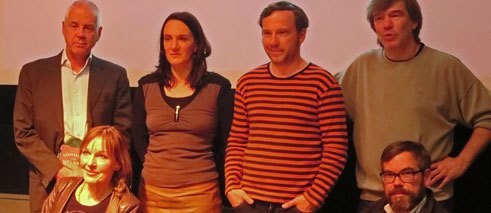Six German Authors In London
Trendspotting

Waves of Difference was the title given to a series of literary events marking the 10th anniversary of Queen Mary’s Centre for Anglo-German Cultural Relations (CAGCR). The events featured six German authors who had spent a 10-week period living in London as beneficiaries of the CAGR’s Writers in Residence programme, whose ten years of existence was also being celebrated. On May 20th the Goethe-Institut London had the pleasure of hosting the last of these events which featured readings, interviews and a discussion. BBC journalist Rosie Goldsmith conducted the interviews and discussion with the writers Angela Krauß, Terézia Mora, Matthias Politycki, Gregor Sander, David Wagner and Michael Wildenhain.
Find out what they had to say about their experiences as writers in residence in London, and their views on today’s German literature!
Terézia Mora emphasised that writers in residence programmes offer a unique opportunity to authors who would usually otherwise lack the means to spend such a long time in a foreign city and sample everyday life there from a resident’s perspective. Thanks to this opportunity an array of impressions and experiences of London are fermenting in the authors’ imaginations and already feature in some of their writings. Michael Wildenhain, for example, read from his work-in-progress, Brixton Calling, with a vivid description of the sights and smells of Brixton market (‘An overpowering stench, a huge variety of fish, seafood, draped sea monsters, creatures, which when he glances at their tentacles, and at the severed heads left in plastic buckets, make him wretch’). Matthias Politycki recited his poem London für Helden: the Ale Trail about an epic London pub-crawl which involved the sampling a variety of British real ales featuring ‘goat-like’ and ‘old floor-cloth’ aromas and other tastes both unfamiliar and baffling to the German beer lover’s palate.
The diversity of themes which featured in these authors’ readings indicated that discerning any clear trends in contemporary German literature is not an easy task. Angela Krauß read a tender and philosophical poem from her volume of poetry Ich muß mein Herz üben / I must train my heart (2009), while David Wagner’s Leben / Lives (2013) deals with the dilemmas faced by an individual undergoing a life-saving organ transplant. The life of the hero in Gregor Sander’s Was gewesen wäre / What might have been (2014) is disrupted by remembrances of a lost love which blossomed in the former GDR, and Terézia Mora’s German Book Prize-winning Das Ungeheuer / The Monster (2013) charts the despair of a grieving husband in the wake of his wife’s suicide.
The authors understandably shared a desire not to be associated with any particular ephemeral ‘trend’ in contemporary German literature, nor to be put in the position of defining what those trends may be. Nevertheless a proliferation of current works which could be termed ‘grandchildren literature’ was cited as one particularly current phenomenon. This refers to the perspective of today’s younger generations who are coming to terms with their grandparents’ lives, bound up as they were with the consequences of Hitler’s dictatorship. Reflecting on the theme of trends in contemporary German literature Matthias Politycki commented that the outlook of the 1990s has gone. The world has changed greatly and writers are travelling more and seeing more and this leads to a less ‘Germany-focused’, more international and open contemporary German literary scene.